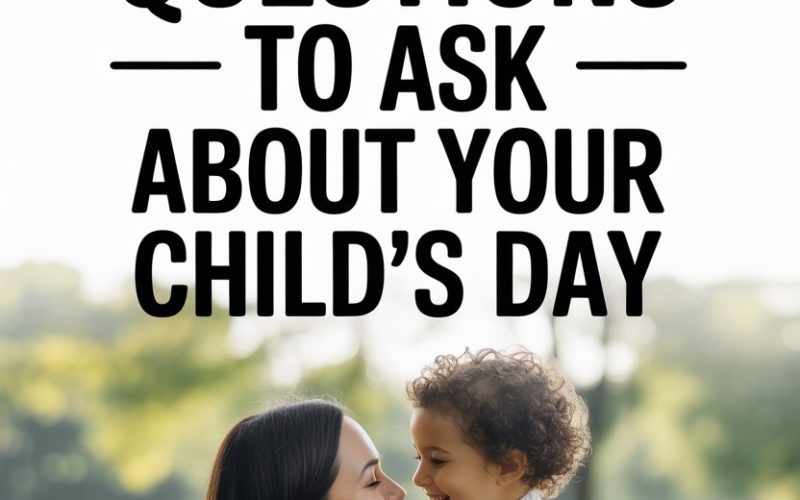Ever tried to get more than a one-word answer about school out of your child? “How was your day?” “Fine.” “What did you do?” “Nothing.”
If only there were a medal for persistence in the daily Q&A games we play with our kids.
The trick isn’t asking more questions—it’s asking the right ones.
Whether your child is five, fifteen, or somewhere in between, thoughtful questions can transform after-school grunts into real conversations.
Here are seven parent-tested, kid-approved questions to kickstart meaningful chats, even when your brain is running on fumes.
1.What made you laugh today?
Sure, we want to know if our kids learned their times tables or if anyone got caught eating glue, but focusing on laughter can reveal so much more.
This question invites your child to share the lighter moments, the inside jokes, and the class clown’s antics.
The best part? You’re setting a tone that life isn’t just about spelling quizzes and neat handwriting. There’s room for joy and silliness.
Plus, laughter is a natural stress-buster—kids (and grownups) process their day through giggles more than we realise.
Research from the American Psychological Association shows that humour helps children cope with challenges and build stronger relationships.
If they struggle to answer, prime the pump with your own story: “I nearly spilt my tea all down my shirt in a meeting—classic Mum move. Anything funny happen in your world?”
2. Was anything tricky or surprising today?
Instead of the old “Did anything bad happen?” (cue worried faces and defensive answers), try this gentler approach.
Asking about surprises or tricky moments covers both the good and the not-so-good, but without setting off alarm bells.
Maybe your daughter had a maths question that made her scratch her head. Maybe your son was shocked when his mate finally learned to tie his shoelaces (at last).
You’ll be amazed at what pops up when you phrase things this way.
Psychologist Dr. Laura Markham encourages parents to create a non-judgmental space for sharing by avoiding blame and simply listening. Show curiosity, not interrogation skills worthy of a detective.
3. Who did you spend the most time with today?
Social circles can be as bumpy as a ride on a dodgy fairground teacup. Checking in on friendships (or those kids they say are “just annoying”) gives you a window into your child’s world.
Maybe there’s a new friend in the mix. Maybe they played alone and enjoyed it—or maybe not. Either way, you’re signalling that relationships matter, and you’re there to listen.
If they mention a falling-out or feeling left out, resist the urge to immediately fix it. Sometimes, a sympathetic “That sounds rough” works wonders.
If your child prefers texting to talking, try the Between Us app or similar options that encourage connection for tweens and teens.
4. What’s something you wish we could do at your school or club?
This question is a sneaky way of finding out what’s missing or what could be better. Maybe your child dreams of a school pet (because you definitely need another mouth to feed), or they secretly wish lunch lasted longer.
Sometimes, this leads to creative solutions. One mum I know started a Friday “bring your own board game” club at her child’s school, all because her son wished playtime wasn’t just for the football-mad kids.
Other times, it leads to healthy venting (“Why can’t we have chips every day?”). Either way, it’s a goldmine for understanding your child’s wishes.
Encouraging kids to imagine positive change is a confidence booster.
Harvard’s Center on the Developing Child notes that simple questions like this help children develop executive function skills—basically, dreaming up ideas and figuring out how things could be different.
5. Did anything make you feel proud, brave, or strong?
Pride isn’t just about winning certificates or smashing the spelling bee. Maybe your child spoke up when they felt nervous or tried something new in art class.
Perhaps they apologised after a squabble with a mate, even though it felt awkward.
Celebrating these moments helps your child recognise personal growth. When they share, resist the urge to react with, “See, I told you you could do it!” Instead, try: “That took guts. Tell me more.”
Focusing on bravery and strength, not just external achievements, builds self-esteem.
A study published in the Journal of School Psychology found that kids who can identify personal victories—no matter how small—are more resilient in the face of setbacks.
6. Did you see someone being kind today?
Shining the spotlight on kindness encourages kids to notice (and value) empathy, which is often lost in the daily hustle. Maybe someone shared their snack, or perhaps a teacher offered help without being asked.
Sometimes, your child will confess to being the champion of kindness themselves, which deserves a quiet cheer. Other days, they might say, “Nope.” That’s okay.
It’s a good moment to chat about why kindness matters, rather than launching into a lecture worthy of a Hallmark card.
Promoting kindness, as shown in this University of British Columbia study, isn’t just a feel-good activity. It actually boosts peer acceptance and improves kids’ sense of belonging at school.
7. Is there anything you’re looking forward to or worried about tomorrow?
Children, just like adults, live part of their lives in the future. This question opens the door for anticipation and anxiety alike. You might learn about an upcoming spelling quiz, football match, or the dreaded Brussels sprouts at lunch.
If your child shares a worry, resist the urge to leap to reassurance. (“You’ll be fine!” often shuts conversation down.) Instead, listen. Sometimes kids just need to voice their nerves.
On the flip side, sharing excitement about a class project or a birthday party lets you share in their joy and helps them savour the good stuff.
Parenting expert Michele Borba recommends asking future-oriented questions to help children develop emotional intelligence and planning skills—handy for everything from sleepovers to GCSEs.
Making Conversation Happen—Even on Exhausted Evenings
After a long day of wrangling work, chores, and whatever mystery stains are on the sofa, meaningful conversation with your child can feel like just another box to tick.
But with the right questions, you’re not just collecting snippets of information—you’re building trust, empathy, and connection.
Try mixing up these questions at dinner, in the car, or during the bedtime wind-down. No need to run through all seven every day (unless you fancy being ghosted by your own child). One or two is plenty.
And if the answers are occasionally “I forget” or “Nothing much,” don’t sweat it.
Sometimes, your child’s silence means they’re processing, not stonewalling.
Keep asking. Keep listening. Your curiosity, and your willingness to hear the quirky, wonderful, and even the frustrating parts of their day, shows your child they matter.
You may never get a full minute-by-minute recap, but you just might get a smile—and every once in a while, a story worth hearing twice.




